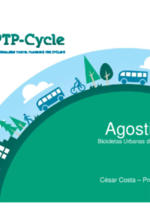
Torres Vedras (Portugal)
Torres Vedras is a city of 77,997 inhabitants (as of 2009) and lies on the west central coast of Portugal just 46 kilometers from Lisbon. It has a rich historical and cultural heritage with traces of pre-historic settlements . For protecting built heritage, smart management of car traffic is in focus.
The modal split in Torres Vedras, according to the National Institute of Statistics, shifted away from sustainable modes between 1991 and 2001. The share for soft modes, including walking, declined from 49 to 30 percent while the share for private cars grew from 33 to 55 percent.
Today about 40,000 vehicles enter the city every day. Because of its proximity to Lisbon and good connections with public transport by road, Torres Vedras has become a popular place for long-term parking among those commuting into Lisbon. About 10,000 people commute from Torres Vedras to workplaces and schools in the capital and the cars they leave behind has created a problem for the city.
In 2007, the city of Torres Vedras adopted a mobility strategy developed in collaboration with a university, the Instituto Superior Técnico. This strategy intends to diagnose major weaknesses of the existing transport system and devise a set of measures to improve mobility and the quality of city life. The city has also developed a mobility plan.
In 2009, the city adopted the Regulation of Parking, Loading and Unloading and Removal of Abandoned Vehicles. This establishes disciplinary tools to enforce transport rules, demarcates public space for parking and elaborates the operation of the public parking system. Areas are designated for loading and unloading freight and restrictions are set on car access to certain areas of the city. In residential areas, free-of-charge street parking is provided for residents who display a special decal in their car windows. Loading and unloading freight is also allowed. The law prohibits the movement of heavy vehicles (over 3.5 tonnes) within the city. The regulation is planned to be fully implemented over the next three years.
Over the next few years, the city also anticipates the development of an urban bicycle path network to complement the existing transport network for commuting to schools and workplaces. The cycling network will include support facilities such as bicycle parking and rest spots. The city also plans to roll out a public bike system with a network of bike stations.
Since 2007 the municipality, in collaboration with the private operator of urban public transport (Barraqueiro), has run a bus system called TUT. At present, there are four bus lines serving schools, commercial areas, health services, public services and most of the rest of the city.
The city has signed a purchase agreement to acquire an electric bus that will circulate between the new Municipal Market and the Regional Exhibition Park, with stops in the historical center. The route will include stops on passenger request.
The city of Torres Vedras belongs to a national network of 25 cities with charging infrastructure for electric cars: the MOBI.E Project. The municipality’s big challenge is to provide incentives for travelers to reduce private car use.











